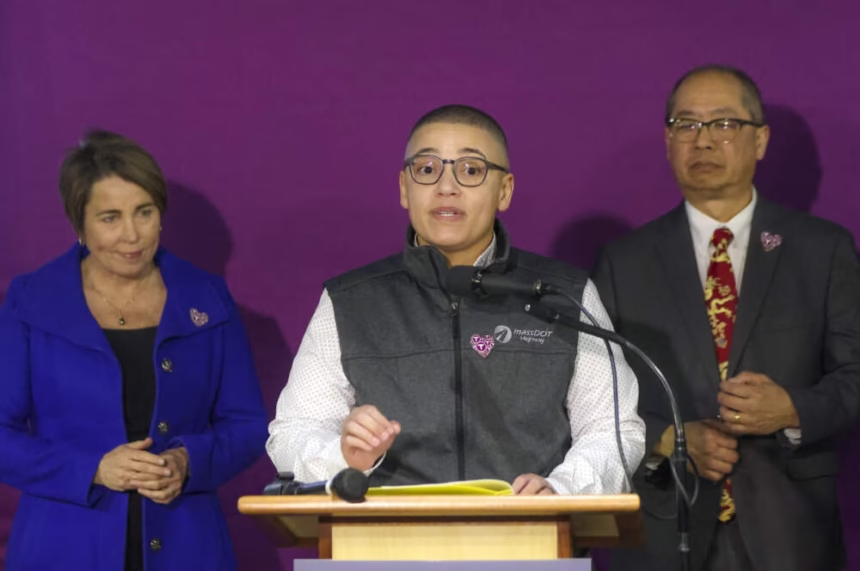Governor Maura Healey has announced the departure of Monica Tibbits-Nutt from her position as Secretary of Transportation and head of the Massachusetts Department of Transportation. Tibbits-Nutt will remain as an adviser through the end of the year. According to the governor’s office, this is “to ensure a smooth and efficient transition for the Department of Transportation.” She will move to the private sector after this period.
The interim role has been assigned to Phil Eng, current General Manager of the Massachusetts Bay Transportation Authority (MBTA). He will temporarily hold both positions. He will maintain operational leadership of the transit system.
In announcing the departure, Governor Healey highlighted Tibbits-Nutt’s record on fare accessibility and major infrastructure projects. The governor emphasized support for fare-free pilot programs in regional transit systems. She also cited the creation of reduced-fare options within the Authority.
“Under her leadership, we have made significant progress on some of the most complex and consequential infrastructure investments in the state’s history, including the Cape Cod bridges, the East-West rail link, and the restoration of the Sumner Tunnel,” the governor stated.
The departure comes, however, on the heels of a significant administrative setback. The Department announced it would relaunch bidding for the rehabilitation and operation of 18 highway rest areas. This follows the September withdrawal of the concessionaire initially selected in June under a 35-year lease. The foreign company chosen cited failed negotiations with the administration and the cost of legal battles. In the short term, the state is attempting to extend contracts with current operators. Their leases expire in January.
Since the summer, the matter has been under legal challenge from Global Partners, a Waltham-based company. The company has alleged ethical violations and conflicts of interest in the procurement process. When recently questioned about the case, Healey defended the Department: “I believe the agency conducted a transparent process.”
Last April, Secretary Tibbits-Nutt also sparked sharp controversy by suggesting the state might consider installing tolls at its borders. The governor immediately distanced herself from the comment. “The secretary’s remarks do not represent the views of this administration, and to be clear, I am not proposing tolls at any border.” The episode left a lasting mark on debates over transportation funding, territorial equity, and long-term revenue sources.
Phil Eng: An Experienced Leader With Dual Responsibilities
The interim assignment was given to Phil Eng, who was appointed to lead the Authority in 2023. This followed heightened scrutiny over safety and performance issues. The governor emphasized his role in turning around public transit. She credited him with overseeing “a transformative period for public transportation in our state.”
“He is a trusted leader with decades of experience in transportation, and I know he is the right person to lead the Department during this period,” Healey added.
Speaking at a press briefing in Boston, Eng said he does not fear the divided priorities associated with his dual role. He indicated he is prepared to serve in the capacity “for as long as necessary.” Regarding his primary mission at the Authority, he reaffirmed: “My commitment and determination as General Manager of the Authority will not change. I will remain equally committed and focused on delivering results. I will ensure that the positive improvements we are seeing today continue and expand.”
Several urgent matters confront the new interim leader. First, stabilizing the rest area issue: finding a temporary solution to prevent service interruptions as winter approaches. He must also ensure consistent service levels for fuel, food, and restrooms. Additionally, he needs to establish a new rehabilitation timeline that does not disrupt major seasonal traffic patterns.
Additionally, it will be necessary to sustain reduced fares and fare-free pilot programs. These must be integrated into the budget trajectory and investment constraints for bridges, tunnels, and rail lines.
For the metropolitan network, scheduling overnight work and planned service interruptions must be communicated transparently to maintain predictability for riders. Safety imperatives will remain priorities. These include audits, action plans, and contractor oversight, especially after several years marked by incidents, delays, and schedule restructuring.
The arrangement of having a strategic Department and an operational Authority, both led temporarily by the same executive, will face scrutiny. Potential agenda conflicts may arise. There may be trade-offs between long-term concerns, such as infrastructure, and short-term needs, like service reliability. The relationship between regulatory and operational functions is also at stake. Local governments, metropolitan authorities, and business partners expect clear timelines, public performance metrics, and advance consultation on major decisions.
In the immediate term, Tibbits-Nutt’s presence as an adviser through December 31 aims to secure the handover of the most sensitive files. Eng must demonstrate that unified leadership can accelerate project execution without diminishing responsiveness to riders.








